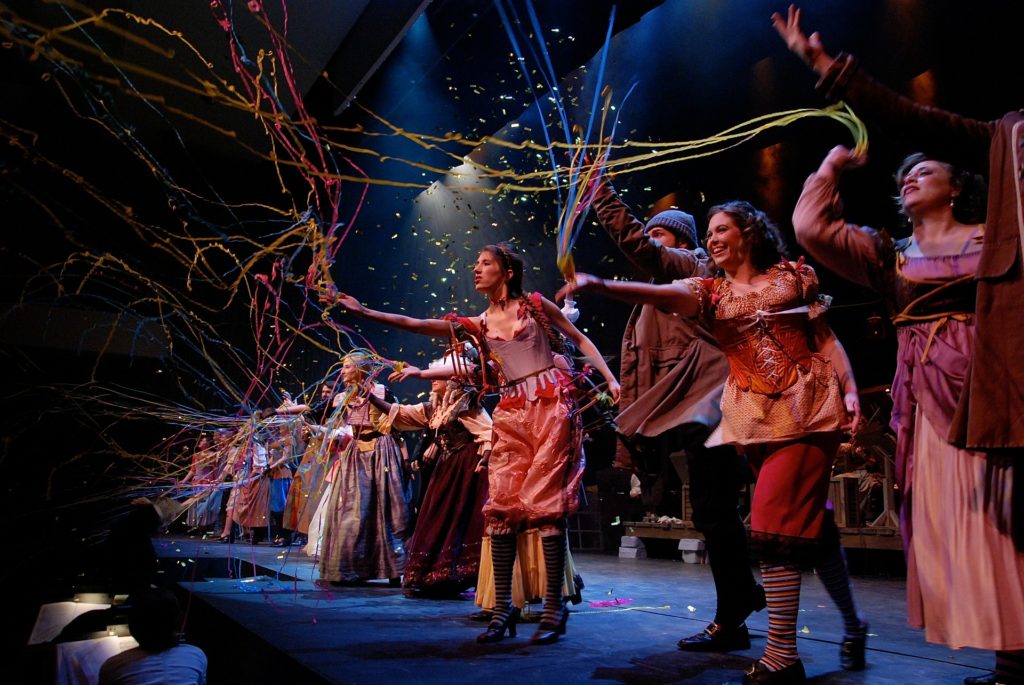Opera boxes?
Yesterday afternoon, as I was idly flicking through Twitter, I discovered some photos of Welsh National Opera’s latest print marketing campaign. The blurb draws parallels between well-known musicals, such as Miss Saigon and Rent, and their operatic parallels (both Madam Butterfly and La Bohème feature in WNO’s upcoming season). Some reactions to this tweet were confused, some complimentary, and others downright sneering: above all, what caught my eye was the profoundly negative interpretation of music theatre writers ‘stealing’, or at the very least doing a terrible job of attempting to reinvent, the operatic scenario. It made me grumpy and rather sad to see this. And of course, the advantage of running a blog is that I have somewhere to explain why.
Anyone who has spent any time looking at the history of opera in whatever century (I speak largely, surprise surprise, from my knowledge of what went on in the nineteenth), will know that the idea of a plot being the single, and singly used, baby of a given librettist is faintly ridiculous. Not only were scenarios bought, sold and recycled all over the place – sometimes with deliberately ironical overtones, sometimes because younger composers thought their settings would be better than the pre-existing jobs by older composers – but also, bad or troublesome plots got passed around a string of composers in the manner of one of those raffle prizes that works itself across the entire county’s worth of WI branches because whoever finds themselves, er, ‘lucky’ enough to have won it wants to get rid of it again as soon as possible. Wagner tried to make a buck by selling on the scenario of The Flying Dutchman. Puccini thought he could do Manon Lescaut better than Massenet had. I wouldn’t be at all surprised if an earlier version of the party game ‘pass the parcel’ was known in France as La nonne sanglante, because the bloody nun passed through the hands of Berlioz, David and Verdi before Gounod finally rolled up his sleeves and produced a work that no one has ever wanted to revise since. The German equivalent would, of course, be called Faust. The frequency with which he turns up in musical settings makes the Harry Potter franchise look pifflingly small and ineffective.

And on the other side of it: anyone who has spent the majority of their time and effort listening to music theatre might not know, or never have heard live, earlier incarnations of the same story. Why should Rent not be their way to Puccini? Why is that a problem? Would you shout at someone who only discovered Gounod’s Faust because they’d heard Arrigo Boito’s Mefistofele and someone had suggested looking back a decade or so at an earlier version of similar material? I’d wager not, unless you hated Gounod… or had decided Gounod was actually aesthetically inferior.
You know what, if you hate Gounod, then that’s your call. You are fully entitled to dislike his music. Just as you are fully entitled to not prefer Jonathan Larson over old Giacomo. That’s your right and is no one else’s to question. What I do question, though, is your decision to shout about it on a form of social media where everything you say is public, and published, immediately. Or perhaps it’s not that I question exactly: I suppose it’s more a case of how firmly you also happen to believe that more people should go to the opera. Whether or not you think operatic repertoire is something rich and wonderful and available to all. Whether you’d like larger audiences and a stronger case for fiscal support, both from private donors and the state. Because if you happen to think that it’s music everyone should have the opportunity to enjoy, and that it’s crucial to grow audiences and help new folks find their way into the opera house, I would suggest that being Loudly Publicly Affronted about those Terrible Musical Rip-Offs is quite a bad idea. Not least because I have a sneaking suspicion that Rossini, Puccini, Gounod, Verdi and others might have been rather interested at the idea of the updated, camera-filmed garret; or that helicopter over Vietnam, as possible stage scenarios. ‘Ways in’ exist in multiple directions… and there’s plenty of room for them all.
